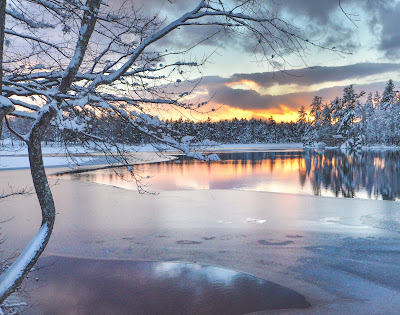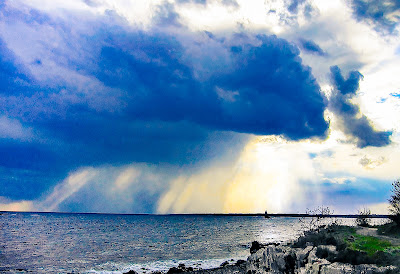 |
| "E B White quote" by Kathleen Tyler Conklin is licensed under CC BY 2.0 |
I sometimes berate myself for the amount of time I spend trying to write. I have no trouble coming up with an idea, but as I write, another thought pops up, and then another, until pretty soon, I've composed a jumbled and inarticulate mess. It takes a lot of time and many revisions to distill the piece down into something smooth and easy to read – that actually says what I want to say.
Recently, I had an insight, after observing what pleasure older folks get spending hours assembling jigsaw puzzles at the medical residence where I am staying. They told me it was relaxing, making time fly by. That struck a nerve with me because that's precisely what writing does for me.
Rather than berating myself for wasting so much time, I should be rejoicing that I have such an all-consuming passion - even if all I ever did with my writing was delete it when I finished, like puzzle solvers do when the game is over, putting the pieces back in the box.
But more than that, writing helps to organize my thoughts. In the process of rewriting, I am able to distill vague thoughts and feelings into clear articulations, previously only indistinct whispers, like the sound of the sea lapping up against the beach. I’ve always considered my writing a personal pursuit. But E. B.White, my favorite essayist, believed writers have a responsibility to society.
White is best known for writing iconic children’s books like “Charlotte’s Web.” But he was, first and foremost, a celebrated writer for adults, considered one of the finest essayists of the 20th century. The Christian Science Monitor praised him for crafting personal essays that, more than three decades after his passing, endure as exemplars of the form.”
Here's a quote from one of my favorites, "One Man's Meat," a collection of his essays about life at his beloved saltwater farm in rural Maine, where he resided a good part of the year.
“Old stone walls ran into the woods, and now and then there would be an empty barn as a ghostly landmark. The night grew frosty and the ground underfoot was slippery with rime. The bare birches wore the stars on their fingers, and the world rolled seductively, a dark symphony of brooding groves and plains.”1
But I digress. As I started to say, writing was more than a craft for White; it was an obligation, which he described this way: while “a writer should concern himself with whatever absorbs his fancy…I do feel a responsibility to society because…a writer has the duty to be good, not lousy; true, not false; lively, not dull; accurate, not full of error. He should tend to lift people up, not lower them down. Writers do not merely reflect and interpret life, they inform and shape life.”2
He felt “a writer must reflect and interpret his society… [providing] inspiration and guidance and challenge.” He was a sage ahead of his times, who recognized, over 50 years ago, the rise of a disturbing trend in social media. And he didn’t like it: "Much writing today strikes me as deprecating, destructive, and angry.”3
I appreciate E. B. White in many ways: He was an optimist: “All that I hope to say in books, all that I ever hope to say, is that I love the world.” He was kind: “By helping you, perhaps I was trying to lift up my life a trifle. Heaven knows anyone’s life can stand a little of that.” (From Charlotte’s Web). He was a philosopher: “Life’s meaning has always eluded me and I guess it always will. But I love it just the same.”4
And most of all, he understood my muddled method of writing: “A great deal of writing is not "plotted"—most of my essays have no plot structure, they are a ramble in the woods, or a ramble in the basement of my mind.”5
xxx
1 One Man's Meat by E.B. White
2 https://www.themarginalian.org/2012/04/17/e-b-white-paris-review-interview/
3 Ibid.
4 https://www.kent-teach.com/Blog/post/2015/07/11/15-wonderful-quotes-from-e-b-white.aspx
5 https://www.thoughtco.com/writers-on-writing-e-b-white-1692831


